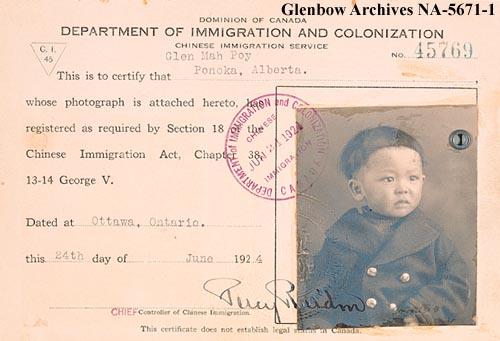July 1, 2023, was 100th anniversary of passage of Chinese Exclusion Act

Learning
It’s okay to not be okay on “Canada Day.”
Saturday, July 1, 2023—Canada Day—marked the 100th anniversary of the Chinese Immigration Act of 1923, commonly known as the “Chinese Exclusion Act,” that was passed by the Liberal government of Prime Minister William Lyon Mackenzie King. This act banned the immigration of Chinese people to Canada until 1948, when Canada became a signatory to the Universal Declaration of Human Rights, which resulted in the act’s repeal. July 1st is marked by some Chinese Canadians as “Humiliation Day.”
Under Section 18 of the act, every person of Chinese origin or descent in Canada, regardless of allegiance, citizenship, or place of birth, was required to register with the authorities and obtain an identity certificate (my Grandpa Glen’s identity certificate is shown above).
In 1923, immigration from many countries was controlled or restricted in some form, but only the Chinese were completely prohibited from immigrating to Canada. This was not the only act specifically targeting Chinese immigration and Chinese Canadians; it was preceded by the acts of 1887 and 1885.
The original 1885 legislation was enacted by John A. Macdonald. He told the House of Commons that, if the Chinese were not excluded from Canada, “the Aryan character of the future of British America should be destroyed….”
This was the exact moment in the histories of Canada and the British Dominions when Macdonald personally introduced race as a defining legal principle of the state. Macdonald’s comments came as he justified an amendment taking the vote away from anyone “of Mongolian or Chinese race” regardless of whether they were “naturalized” or born in Canada. He warned that if the Chinese (who had been in British Columbia as long as Europeans) were allowed to vote, “they might control the vote of that whole Province” and their “Chinese representatives” would foist “Asiatic principles,” “immoralities,” and “eccentricities” on the House “which are abhorrent to the Aryan race and Aryan principles.” He further claimed that “the Aryan races will not wholesomely amalgamate with the Africans or the Asiatics” and that “the cross of those races, like the cross of the dog and the fox, is not successful; it cannot be, and never will be.”*
Macdonald’s commentary on the necessity of the act, specifically the need to keep Canada “Aryan” by discouraging mixed-marriages, went beyond immigration. His sentiments would abet an insidious unregulated regime of informal anti-miscegenation (anti-interracial marriage/intimacy) policies enforced through different laws and courts in Canada (see Velma Demerson and Harry Yip, and Isabella Jones and Ira Johnson) in addition to the institutional and cultural systems that enforced extra-legal segregationist law (Viola Desmond, Quong-Wing v. R, Christie v. York Corporation, Noble and Wolf v. Alley, Narine-Singh v. A.G. of Canada).
Canada’s “founding father” was a racist, who believed (among other White supremacist beliefs) that I as a mixed-race person should not exist, and that my ancestors should not be part of the Canadian experience.
Canada is the only home I’ve ever known. It’s a great country, and I consider to myself to be a patriot in the sense that I love my country and want to see it succeed. Patriotism on Canada Day has been virtually impossible for me to muster, though, as I continue to learn more about Canada’s history of colonialism, genocide, and racist policy championed by its founding prime minister.
On this 100th anniversary of the passage of the Chinese Exclusion Act, I am arguing that reckoning with the truth of history is an authentic and defiant act of patriotism, an exercise in civics and nation building. Understanding the terrors and triumphs of your country’s history is an act of loyalty. Learning from that history to ensure that all people can live, thrive, and be free to be their best selves in Canada is an act of love.
But I won’t be waving a flag.
Faith Reflection
I hope that you will join me in holding in prayer all those who choose ignorance.
I hope that you will join me in holding in prayer all those who glorify the past without understanding it.
I hope that you will join me in holding in prayer all those who wish you to just move on and get over it.
I hope that you will join me in holding in prayer all those who use patriotism as an excuse to be bigoted.
I hope that you will join me in holding in prayer all those who have mixed, conflicted, traumatic, defiant, sad, furious, powerful, and hopeful emotions on July 1st.
I hope that you will join your fellow Canadians in an honest, authentic, and good-faith examination of history.
Living It Out
I invite you to consider this question on July 1: What does defiant, disrespectful, and honest patriotism mean to you?
If you would like to know more about the 1923 Chinese Exclusion Act, visit the Chinese Canadian Museum in Vancouver, your local library, or Historica Canada. If you would like to get involved in shaping a better future for all people in Canada, contact your local reconciliation, Pride, refugee, anti-racism, or human rights organization or your local friendly neighbourhood justice animator.
—Chris Mah Poy (he/him) is the First-Third Ministry Coordinator and Networks and Justice Support at Chinook Winds Regional Council and a mixed-race Canadian. He reflected on his own personal and family story. A version of this blog was first shared in Prairie to Pine Regional Council’s Intercultural News, June 29, 2023.
*Canada, House of Commons, Official Report of the Debates of the House of Commons of the Dominion of Canada (Ottawa: Maclean, Roger & co, 1885), 18, May 4, 1885, 1582.